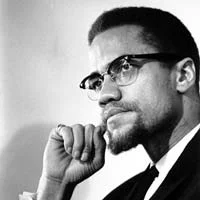
| Born: May 19th, 1925 in Omaha, Nebraska |
| Died: February 21st, 1965 (at age 39) in New York City, New York |
| Fields: Civil Rights, Politics, Religion |
| Famous For: Being an African-American human rights activist |
Malcolm X holds a place in American history as one of the most important figures of the 20th Century, not just as an activist for African American issues, but as a political and cultural philosopher which influenced the views of his fellow black Americans and all Americans.
He was born Malcolm Little in 1925 in Omaha, Nebraska. His mother, Louise, was a native of Grenada, and his father, Earl, was from Georgia. Malcolm’s father was something of an activist in his own right. He served as a Baptist lay minister and also worked with the Universal Negro Improvement Association.
Young Malcolm’s early life would be quickly filled with tragedy and strife. His father died mysteriously after being hit by a streetcar. Malcolm was six years old. Some say his father was murdered after being pushed in front of the streetcar by white supremacists. Others claim it was an accident. One of Earl Little’s insurance providers ruled his death a suicide, and refused Louise Little payment of benefits causing further financial hardships for the family.
Historians believe that at least one, and possible three of Malcolm X’s uncles were murdered by white supremacists. Whatever the case, the fate of his elders showed how dangerous it was to be a black man in 1930’s America. The violent deaths of so many of his family members would be a powerful influence on Malcolm’s development and view of white society.
Louise Little suffered a nervous breakdown in 1938 which resulted in her commitment to a mental hospital for the next 24 years. This meant Malcolm would spend the rest of his childhood bounced between foster homes.
Young Malcolm was clearly an extremely intelligent student. He had aspirations to study law, but his teachers told him that a career in law as “no job for a nigger.” This intense atmosphere of racism and discrimination shaped the world view and attitude of young Malcolm, making him angry, bitter, and driving him toward radical groups which were pro-black and anti-white.
It also caused him to pursue a life of petty crime in his early years. This landed him an 8-to-10 year prison term in 1946 when he was 20 years old. He was paroled in 1952, but it was in prison that Malcolm X’s life took an important turn. It was behind bars that he became a member of the Nation of Islam led by Elijah Muhammad.
It was also at this point that Malcolm Little became Malcolm X. It was the practice of Nation of Islam members to abandon their birth names because most black American did not know their true, original African names, and most had adopted the names of the their former slave owners. Malcolm legally changed his name to El Hajj Malik El Shabazz, but was better known as Malcolm X.
About a dozen years after taking the faith of Islam; however, Malcolm X would become disillusioned with the agenda of the Nation of Islam. He severed his connection with the group in 1964. It is believed this is what precipitated his assassination in 1965 by Nation of Islam members.
After leaving the Nation of Islam, Malcolm X traveled extensively in Africa and Arab nations where he became a devout Sunni Muslim. He completed a Hajj – the pilgrimage to Mecca. It was here that Malcolm X absorbed a larger spiritual understanding, and developed a more expansive view of why human beings act as they do.
Overall, the important intellectual influences of Malcolm X was born out from the years 1952 until he was killed in 1965. He left no writings of his own behind, but his many speeches, lectures, media interviews and more form the basis of his social and political philosophy.
Malcolm X is viewed as evolving from a radical and extremist black leader advocating the separation of black and whites, to a somewhat more moderate and pro-active advocate for African American equality. His best known quote is that blacks should strive to achieve freedom, justice and equality “by whatever means necessary” which has been interpreted as an advocacy for violence if the situation called for it.
While he was long skeptical and harsh critic of the Civil Rights movement as led by Martin Luther King, but later embraced some of the policies of the latter, while also holding firm to his own long-held views on the vast differences and conflicts between white and black cultures.